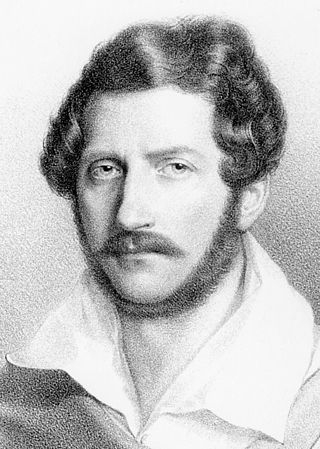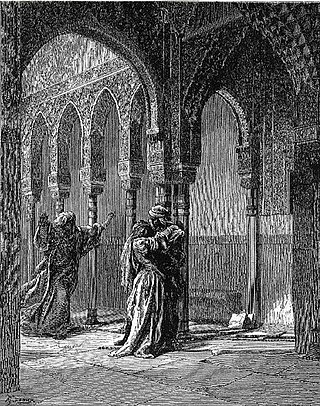
Il campanello or Il campanello di notte is a dramma giocoso, or opera, in one act by Gaetano Donizetti. The composer wrote the Italian libretto after Mathieu-Barthélemy Troin Brunswick and Victor Lhérie's French vaudeville La sonnette de nuit. The premiere took place on 1 June 1836 at the Teatro Nuovo in Naples and was "revived every year over the next decade".

Alahor in Granata is an opera in two acts by Gaetano Donizetti to an anonymous Italian libretto after Jean-Pierre Claris de Florian's text Gonzalve de Cordoue, ou Granade reconquise (1793). However, it seems that the original basis of the libretto goes back to one by Felice Romani written for Meyerbeer in 1821, which in turn can be traced back through another iteration to begin with the de Florian version.

Olivo e Pasquale is a melodramma giocoso, a romantic comedy opera, in two acts by Gaetano Donizetti. Jacopo Ferretti wrote the Italian libretto after Antonio Simeone Sografi's play.

Ugo, conte di Parigi is a tragedia lirica, or tragic opera, in two acts by Gaetano Donizetti. Felice Romani wrote the Italian libretto after Hippolyte-Louis-Florent Bis's Blanche d'Aquitaine. It premiered on 13 March 1832 at La Scala, Milan.

Emilia di Liverpool is a dramma semiserio, ("half-serious") dramatic opera, in two acts with music by Gaetano Donizetti. Giuseppe Checcherini wrote the Italian libretto after the anonymous libretto for Vittorio Trento's Emilia di Laverpaut, itself based on Stefano Scatizzi's play of the same name. It premiered on 28 July 1824 at the Teatro Nuovo in Naples.

Il diluvio universale is an azione tragico-sacra, or opera, by Gaetano Donizetti. The Italian libretto was written by Domenico Gilardoni after Lord Byron's Heaven and Earth and Francesco Ringhieri's tragedy Il diluvio (1788).

Zoraida di Granata is a melodramma eroico, in two acts by Gaetano Donizetti. The Italian libretto had been partly prepared by Bartolomeo Merelli, based on the French play, Gonzalve de Cordoue ou Grenade Reconquise by Jean-Pierre Claris de Florian (1791), and on a libretto by Luigi Romanelli to an opera by Nicolini called Abenamet e Zoraide.

Maria de Rudenz is a dramma tragico, or tragic opera, in three parts by Gaetano Donizetti. The Italian libretto was written by Salvadore Cammarano, based on "a piece of Gothic horror", La nonne sanglante by Auguste Anicet-Bourgeois and Julien de Mallian, and The Monk by Matthew Gregory Lewis. It premiered at La Fenice in Venice, on 30 January 1838.

Gemma di Vergy is an 1834 tragedia lirica in two acts by Gaetano Donizetti from a libretto by Giovanni Emanuele Bidera. It is based on the tragedy Charles VII chez ses grands vassaux(Charles VII and His Chief Vassals) (1831) by Alexandre Dumas père, which was later to become the subject of the opera The Saracen by the Russian composer César Cui.

Imelda de' Lambertazzi is a melodramma tragico or tragic opera in two acts by Gaetano Donizetti from a libretto by Andrea Leone Tottola, based on the tragedy Imelda by Gabriele Sperduti. It received its first performance on 5 September 1830 at the Teatro San Carlo, Naples.

Gianni di Calais is a melodramma semiserio, a "semi-serious" opera in three acts by Gaetano Donizetti (1828), from a libretto by Domenico Gilardoni, based on Jean de Paris by Louis-Charles Caigniez.

La zingara is an opera semiseria in two acts by Gaetano Donizetti, set to a libretto by Andrea Leone Tottola after La petite bohémienne by Louis-Charles Caigniez, which was itself derived from a work of August von Kotzebue.

Alfredo il grande is a melodramma serio or serious opera in two acts by Gaetano Donizetti. Andrea Leone Tottola wrote the Italian libretto, which may have been derived from Johann Simon Mayr's 1818 opera of the same name. The opera tells the story of the Anglo-Saxon king Alfred the Great.

Giovanni Ruffini was an Italian writer and patriot of the early 19th century. He is chiefly known for having written the draft of the libretto of the opera Don Pasquale for its composer Gaetano Donizetti.

Sancia di Castiglia is an Italian opera seria in two acts by Gaetano Donizetti to a libretto by Pietro Salatino. It was first performed at the Teatro San Carlo in Naples on 4 November 1832, conducted by Nicola Festa.

Don Gregorio is an 1826 opera by Gaetano Donizetti from a libretto by Jacopo Ferretti and adapted from his popular 1824 opera buffa L'ajo nell'imbarazzo, which had enjoyed considerable success when presented at the Teatro Valle in Rome on 4 February 1824.

Il giovedì grasso is a farsa in one act by Gaetano Donizetti, from a libretto by Domenico Gilardoni. The literal translation of the title is "Fat Thursday", a reference to Carnival celebration. The libretto was adapted from the French comedies Monsieur de Pourceaugnac by Molière and Le nouveau Pourceaugnac by Charles-Gaspard Delestre-Poirson and Eugène Scribe. The opera uses spoken dialogue rather than recitatives, and the buffo role is given in the Neapolitan language. The work premiered at the Teatro del Fondo in Naples on 26 February 1829.

Una follia is a farsa in one act by composer Gaetano Donizetti. The work premiered on 15 December 1818 at the Teatro San Luca in Venice. The opera uses the same Italian-language libretto by Bartolomeo Merelli after August von Kotzebue's Der Graf von Burgund that Donizetti used for his Enrico di Borgogna a month earlier, but with different music. It was given one performance and "never performed again, and its score has never been found."

La lettera anonima is a farce in one act composed by Gaetano Donizetti in 1822 to a libretto by Giulio Genoino, a former monk and the official censor of the Kingdom of the Two Sicilies. Genoino based his libretto on his own farce which, in turn, had been based on Mélite, ou Les fausses lettres by Pierre Corneille in 1630.

Il paria is an opera in two acts by Gaetano Donizetti from a libretto by Domenico Gilardoni, based on Le Paria by Casimir Delavigne and Michele Carafa's Il paria with a libretto by Gaetano Rossi.






